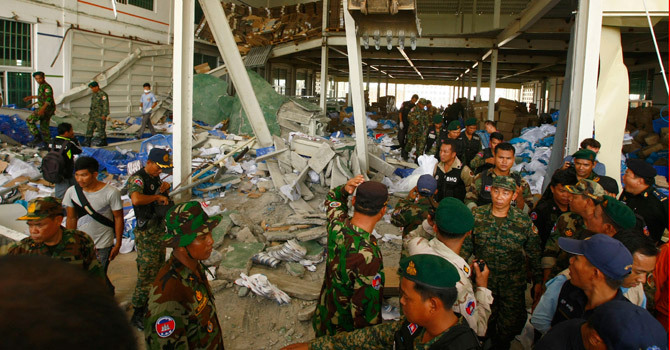Could Cambodia’s open door policy to multinational garment factories be creating an climate for impending disaster…
The partial collapse of a shoe factory in Cambodia’s southern Kampong Speu province has added to the growing death toll in Asian garment factories. At least two people were killed with dozens more injured when a portion of the ceiling collapsed at a footwear factory in Tream Tbal, located about an hour’s drive southwest of Phnom Penh.
It is unknown what caused the building to collapse — faulty construction and an overloaded shelf have both been blamed — but Ken Loo, the secretary general Garment Manufacturers Association in Cambodia was quick to label the incident a “one-off” occurrence and not a symptom a “industry wide deficiencies”.
Only hours after the incident Loo was quick to differentiate this accident from the recent disaster at a garment factory in Bangladesh; one that resulted in the deaths of more than 1,100 people. The garment industry is, after all, Cambodia’s biggest export earner, with more than $4 billion worth of products shipped to Western countries each year. Over the past ten years the number of garment factories in Cambodia has nearly doubled, with the government continuing to pledge to throw it support behind the industry.
Clothing retailers looking for cheap production facilities are expressing an increased interested Cambodia as a desirable location for profitable garment factories. With smaller operating costs that most multinational’s home country — significantly lower wages need to be paid, smaller building costs and lax health and safety policies — along with the Cambodian government’s apparent will to draw in any and all investments, the climate seems ripe. This influx of business means that conditions inside such factories promises to be an ongoing problem.
The growing number of garment factories, or sweatshops, should be of concern those who end up working there and also to the millions of Europeans and North Americans who purchase the cheap wares that keep the establishments in business. While abolitionists and those with reactionary moral centers scream for an absolute end to low wage factories, but the sad truth is in many occasions the alternative isn’t any better.
On the outskirts of Siem Reap and Phnom Penh there are communities who existence is determined by the garbage dumps they live in. Many dump residents, children included, spend their days scavenging among the mounds of trash, through the putrid garbage and toxic waste for little more than a few dollars a day. Loss of life and limb isn’t uncommon, with the influx of both trucks and human waste. Factory work is seen as a way out of the dump.
The country depends on the jobs and export dollars provided by sweatshops, but the practice impacts more than the economy. The health and safety of those employed to produce the cheap T-shirts needs to start being factored into the cost / benefit equation.
Writing for the Carnegie Council for Ethics in International Affairs, Sanjay Reddy and Christian Barry argue that a new incentives, be it wage subsidies, additional access to markets in richer countries or assistance with the costs of reforms to improve work environments can be accomplished while keeping the cost of business low enough to attract overseas investors.
“The global trading system should be designed in a manner that recognizes the limited resources and enforcement powers of governments in poorer countries and that respects relevant differences in priorities and social norms. It should tailor expectations concerning labour standards to the level of development of each country so as to promote workers’ interests without setting expectations that are unreasonably high.” — Sanjay Reddy and Christian Barry
By rewarding countries who promote labour standards improvements and fair livelihoods for their workers — fair based on the country the factory is located in — there could be incentive to change the industry as a whole. Cambodia can’t afford to lose its factories and the West isn’t about to stop buying cheap clothes; it seems that the reality of what this means is slowly coming to head with unfortunate and deadly consequences.


